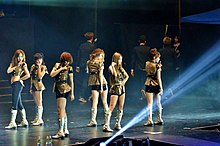Chinese idol

TheChinese pop musicindustry has a growing trend of idols and idol groups, who are entertainers manufactured and marketed for their image and attractiveness. Idols are primarily singers (either as members of a group or as solo acts), but they are also trained in other roles, such as acting, dancing, and modeling. Unlike other celebrities, idols are promoted through merchandise and endorsements by talent agencies while maintaining a carefully curated public image and social media presence, as well as a strongparasocialconnection with a passionate fan base through concerts and meetups.
History
[edit]The Chinese entertainment industry adopted the concept of "idols" fromJapanandSouth Korea,where thousands of teenagers undergo years of training, and only a select few eventually debut in idol groups that generate income for their agencies through the release of musical records, sale of merchandise, brand endorsement deals, and concert revenue.[1]
The early 2010s saw the rise in popularity of Japanese-style idol groups such asSNH48[2]andTFBoys.On January 27, 2017, some members of SNH48 performed on theCCTV New Year's Galaas backup dancers during a segment with Coco Lee and JJ Lin.[citation needed]This was the first appearance by an idol group at a major Chinese event. Korean idol groups such asExo-M,SJ-MandT-araalso reached a larger audience through performances in China.[citation needed]
The success of Chinese reality showsIdol ProducerandProduce 101 China,produced byiQiyiandTencent Video,has led commentators to label 2018 as the start of theAge of Idols.These shows feature about a hundred contestants undergoing training, performances, and eliminations through audience votes, culminating in a few debuting as idol band members. Together, the shows were viewed 8.07 billion times, creating buzzwords like "C-position" for the central role in a performance.[3][4][1]Idol groupsNine PercentandRocket Girls 101debuted through these shows.[5]Other idol competition showsYouth With YouandProduce Camp 2019followed in 2019.[6]
Examples of other K-pop style idol groups includeR1SE,INTO1,and many more.[citation needed]

Government regulations
[edit]On September 2, 2021 China'sNational Radio and Television Administrationcracked down on idol reality TV, going as far as to ban idol competition shows[7][8][9][10]after multiple fandom controversies surrounding the massively popular idol talent showYouth With You 3,which was taken off air in May 2021.[11][12][13]
As part of the Chinese government's wider crackdown on the technology and entertainment sectors, theNational Radio and Television Administrationincluded in an eight-point plan that "sissy idols," effeminate men, "overly entertaining" things are to be prohibited.[14]The entertainment sector is to promote traditional and socialist culture, and establish "correct beauty standards".[15]The Communist Party's propaganda department accused the entertainment industry of negatively influencing youth and polluting society. TheCyberspace Administration of Chinaalso called for an end to toxic celebrity fandom culture,[14]with a 10-point plan which addresses stopping the spread of "harmful" information, gossip, and scandal within fan groups. The government has also prohibited the publication of celebrity ranking lists and the practice of charging fans to vote in celebrity reality competition shows.[15]
See also
[edit]References
[edit]- ^abDing, Gang; Zhang, Boyuan; Teng, Jing Xuan (2018-08-17)."China's Teen-Idol Obsession".Caixin.Retrieved2024-06-07.
- ^Yin, Yijun (2019-06-21)."Born Again: China's Girl Groups and the Life Cycle of a Stardom".Sixth Tone.Retrieved2024-06-07.
- ^Achim, Adina-Laura (18 November 2019)."The Rise of Idol Economies in China".Jing Daily.
- ^"China's Pop Idols are Too Soft for the Party".12 November 2018.
- ^"Ngẫu nhiên luyện chín người đoàn xuất đạo! Thái từ khôn phạm thừa thừa vô trì hoãn lâm ngạn tuấn bạo lãnh".6 April 2018.
- ^Giản, tử kiều (8 June 2019)."Quán quân ước chừng thắng đệ nhị danh 2300 vạn phiếu! 《 sáng tạo doanh 2019》 cuối cùng 11 người danh sách ra lò".Yahoo kỳ ma danh nhân giải trí.Yahoo.Retrieved12 February2020.
- ^"China bans talent shows in showbiz crackdown – DW – 09/02/2021".dw.Deutsche Welle (DW).
- ^"China bans reality talent shows".The Hindu.THG PUBLISHING PVT LTD. 2 September 2021.
- ^Ni, Vincent; correspondent, Vincent Ni China affairs (2 September 2021)."China bans reality talent shows to curb behaviours of 'idol' fandoms".The Guardian.Guardian News & Media Limited.
{{cite web}}:|last2=has generic name (help) - ^"China Bans Reality Talent Shows In Major Showbiz Crackdown".NDTV.NDTV CONVERGENCE LIMITED.
- ^Yau, Elaine (5 May 2021)."Chinese boy band show goes off air after allegations against competitor".South China Morning Post.South China Morning Post Publishers Ltd.
- ^Looi, Sylvia (10 May 2021)."After controversies, no winners for China's 'Youth With You 3' as producers cancel finals".Yahoo News.Yahoo.
- ^Yuan, Ye (2021-08-27)."Streaming Service iQiyi Cancels Idol Competitions, Online Voting".Sixth Tone.Retrieved2024-06-07.
- ^abFrater, Patrick (2021-09-03)."China Wants 'Sissy Idols' and 'Effeminate Men' Scrubbed From Entertainment Industry".Variety.Retrieved2024-06-07.
- ^abZhang, Phoebe (2021-09-02)."China releases plan to ban 'sissy idols', promote a 'correct beauty standard'".South China Morning Post.Retrieved2024-06-07.
